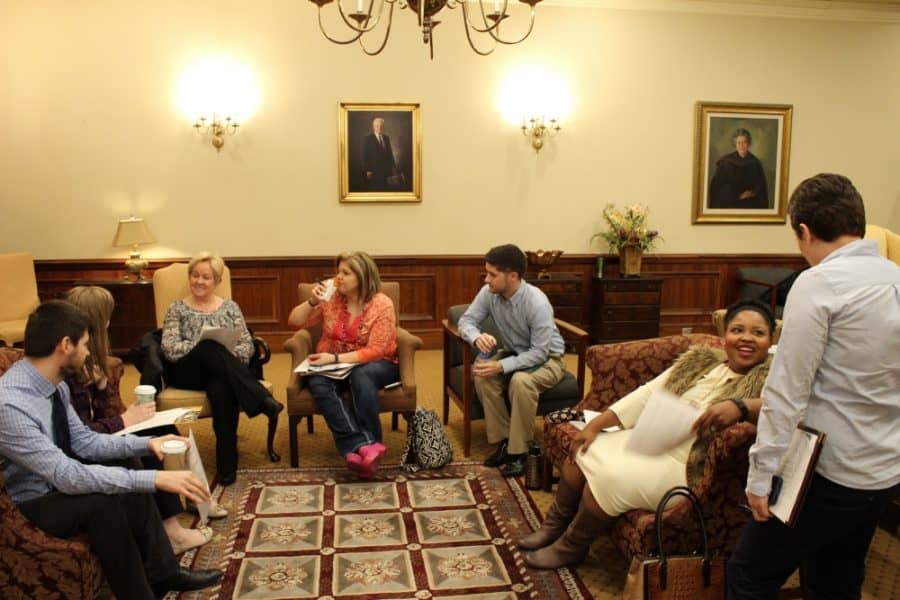While some members of The University of the Alabama community entered their first classes or rolled out of bed, a group of about 50 students and employees met to discuss how to make the University a more inclusive place—and to eat breakfast while doing it.
On Wednesday morning, The University of Alabama Crossroads Community Engagement Center hosted their monthly Inclusive Campus Breakfast at the Ferguson Center. The purpose of these meetings is to encourage networking and collaboration across campus to address issues of diversity and inclusion. The event is open to everyone interested in making the University more welcoming and inclusive. Discussions, dialogue, campus-wide planning and a continental breakfast were all part of the meeting this month.
“We started this two and a half years ago to gather people together to increase our ability to promote diversity and inclusion on campus,” said Crossroads Director Lane McLelland. “We knew there were so many people that were doing diversity efforts but didn’t know about what other people were doing around campus. So we decided to get everyone together and provide this monthly opportunity to meet each other and work together.”
This month’s meeting had approximately 50 attendees including students, professors, residence hall coordinators and anyone who was interested in inclusivity efforts at the University.
This meeting featured discussion of the findings from the diversity mapping research presented to campus this past Monday. The study’s results were introduced by associate provost for administration Jennifer Greer, and G. Christine Taylor, vice president and associate provost of diversity, equity and inclusion, shared her thoughts on what the results of the study mean for the campus as they move forward.
“I saw from the study that there are many excellent diversity activities happening on our campus,” Taylor said on the 1,695 diversity efforts at the University. “But we have to focus on how we not only keep up this energy toward diversity but also marshal our collective efforts in a very strategic way. The goal here is to change the culture of our institution. This takes a very long time, so we have to make sure that we are using all of our resources in order to maximize the results.”
A part of this plan for a more cohesive campus-wide diversity effort that Taylor brought up is a new website. The new website would display all of the diversity initiatives on campus to make it easier for groups to coordinate together and also for students to access and join any of these opportunities.
Taylor also proposed her plan to introduce listening sessions for people to voice their concerns and interact with the the University on issues of diversity and inclusion.
“There will be different sessions for undergraduate and graduate students and for faculty and staff so that they can be more focused and interactive,” Taylor said. “They are an opportunity for me to get in tune with more of the campus that I might not be in on my sixth week and third day here.”
Taylor said she would like for these sessions to last about two hours and any group can set up a listening session. The sessions are planned to be available for scheduling sometime this semester. Groups interested in organizing a listening session can contact Taylor at [email protected].
Toward the conclusion of the meeting, attendees broke up into small groups to discuss the planning and discussion of the upcoming LGBTQ+ History Month, African American History Month and inclusion in the classroom.
The next Inclusive Campus Engagement Breakfast will be at the Ferguson Center on Nov. 1 at 8:30 a.m.







